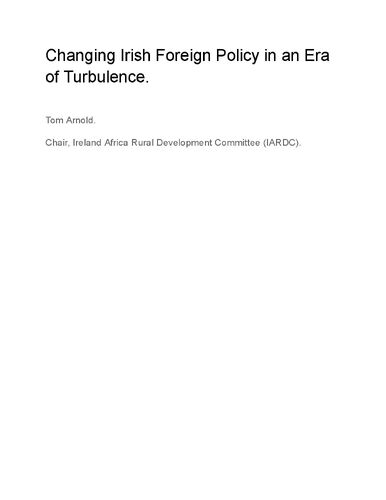Executive Summary
The Trump Presidency has radically changed US domestic and foreign policy since it took office
on 20 January 2025. Its announcement on 2 April of a wide range of tariffs has triggered fears of
trade disruption and of a possible global economic recession. The US foreign policy changes
represent a major reset of international relationships and rules which have prevailed over the
past 80 years in the post-World War II era. Allied to the wide-ranging economic implications of
artificial intelligence (AI), the world may be pivoting on a historical turning point involving major
political and policy change.
Ireland’s domestic and foreign policy will have to adjust to these changes. The paper focuses on
the humanitarian and development part of Irish foreign policy and identifies a number of
international events over the next five years at which Ireland has the opportunity to make a
distinctive contribution which can yield political and economic benefits.
The new US policy prioritizes its ‘America First’ stance and represents a retreat from a
leadership role in tackling global problems. But these problems - global warming, regional and
local conflicts, inequality - remain and in many respects are getting worse. Movement towards a
multipolar world, where power is distributed among multiple large and influential states, is
evident.
The main short-term political decisions for Irish policy will focus on economics, particularly on
the response, in collaboration with the EU, to the tariff proposals and additional changes in US
tax policies.
Broader foreign policy will need to adjust to the changing geopolitics. Ireland has built a strong
reputation over decades in such areas as peacekeeping, human rights, humanitarian and
development policies, and food and nutrition security. The new geopolitics affects each of these
areas, through the move towards US isolationism and the undermining of the current multilateral
system; the large increase in global defence spending, including at EU level, which is a key
factor in the reduction in Overseas Development Assistance (ODA); and the growing inequality
between rich and poor at international level.
This paper suggests that the current and likely future global turmoil may offer political
opportunities for Ireland, at domestic and international level. Such opportunities would be
founded on Ireland’s long-standing political credibility and policy consistency and coherence in
certain areas.
The paper’s central proposition is that, for the part of foreign policy covered by
humanitarian and development matters, the Irish government should agree on a
high-level statement of intent on the substantive foreign policy commitments it plans to
implement over its five-year governmental term. These would include:
● The four important international meetings in 2025: Nutrition for Growth (N4G);
The Fourth International Conference on Financing for Development (FfD4); UN
Food Systems Summit +4 (UNFSS+4); COP 30 on Climate Change.
● The Irish EU Presidency in 2026.
● Future Ireland/EU/Africa strategy, to be published in 2026.
● Playing a leadership role in developing a set of global commitments to succeed
the Sustainable Development Goals (SDGs) post-2030.
The paper discusses in detail the four meetings in 2025 while the EU Presidency, the
Ireland/EU/Africa strategy and the future SDGs are dealt with in more general terms.
In each of these areas, Ireland should seek to be a political and policy leader, drawing on the
lessons of its own development experience over the past 50 years and the coherence between
its current domestic policy and its advocacy in its foreign policy.
The paper sets out an assessment of the new realities which confront Irish policy. It proposes a
set of interlocking priorities - food and nutrition security; health and human capital; and climate
justice and action - which should be central to foreign policy in informing Ireland’s positioning in
its international engagements. A strong emphasis on gender equality should be a cross-cutting
thread running through these priorities.
It draws on past examples of successful Irish influencing at international level to indicate the
nature and the level of political, official, and societal coordination required to optimise Irish
efforts. It suggests there will be political opportunity at both the domestic and international level:
domestically, in forging a political and societal consensus around these issues; internationally, in
positioning Ireland as a leader in a multilateral system capable of responding to global
problems. It concludes by specifying the political and economic benefits accruing to Ireland
should the proposed changes be implemented.
